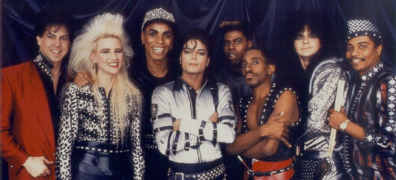What I learned from touring with Michael Jackson… and more than four decades in the music industry
Rory Kaplan, a music industry veteran with 45 years of experience, including collaborations with Michael Jackson and Stevie Wonder, emphasises the critical need for artists to meticulously document and preserve their musical creations.

Congrats to all of the Grammy Award nominees! How exciting to be recognised for your creative and musical talents. Our love of music binds us, and I love how our community of creators continues to grow and inspire others. Throughout centuries, music has been used to preserve cultural heritage and traditions. I myself have worked in the music industry for nearly forty-five years as an artist, executive producer, and producer, and I am currently a subject matter expert at Iron Mountain Entertainment Services in the art of preserving musical archives.
I’ve been fortunate to grow up with incredible musician friends - most of whom have become major artists themselves - and have completed several world tours both as a technician and musician. I’ve worked with Michael Jackson, Stevie Wonder, Donny Osmond, Herbie Hancock, George Duke, Christopher Cross, and many others. I’ve performed on 18 world tours, played on and/or done programming for over 100 albums, and executive produced over 180 surround sound projects.
The most commonly asked question I get is,
“What’s one thing you would tell an artist starting out in the industry?”
And every time I say,
“Save your work.”
I don’t mean save it to your phone or the cloud. I mean, take a few minutes to really save and capture the metadata of your creation: your name, song title, date, what instruments were used on which track, what level the tape machine was set to, and other details.
I’ve worked in the music industry since high school. Back then, we would make demos or record our shows on cassettes. Occasionally, we would write the date or gig we performed, but we never thought the recording would be used for more than that night’s fun. Where are those songs now? Where are those tapes?
Over the years, as I began to work with major artists in the studios, sometimes I would see either the engineer or second engineer write copious notes on the track sheets and tape box. I started to notice notes about the artist, the song, and the instruments. I should have done that, and more of it. So should you.
Let’s all acknowledge that it’s difficult to take notes when the asset keeps changing on what the mixes are stored! Quad mixes were done in the 1970s; however, consumer delivery was not available to the masses and was expensive back then. In the 1980s-1990s there were new formats for recordings, digital tape machines, 8-channel ADAT, and D-88 with several other D-88s synced for multiple tracks, but labelling wasn’t always very clear. There was a big change in the 1990s when surround sound was the focus.
When I became an executive producer in 1996 for a major company that specialised in creating music content in 5.1, I would have to request the original multitrack master recordings for every album we remixed. Sometimes, I had to reach out to the artist or the original engineer, as was our normal practice, to get the missing metadata information about the tapes, tones to align the tapes, etc., for playback alignment, which vocal was the final lead, whatever was missing. It was important to gather all that information. I recall some tapes were so old that remediation was needed in order to recapture the information recorded intact and transfer it to a digital format or to another second tape. I have more stories of not finding assets, original songs becoming lost, and important metadata not being recorded for proper recognition.
This brings me to the here and now: are today’s gifted artists preserving their creations? I’m not just talking about the recording that the label might own for now, I’m also inquiring about their lyrics on the napkin or notepad, the clothes they wore in their videos or events, the notes they received from other artists congratulating them, even the photos they have at their recording sessions, or backstage at one of their concerts. These are everyday things we normally don’t think about when we’re starting a career, but what I can remind them is they are really important for protecting and sharing your legacy. Plus, with social media, song catalogue publishing, and repurposing of master recordings to put in new formats and future formats, it’s become clear to me that as technology changes, managing our journey, no matter how big your dream is, you never know the value you have unless you take care of your assets and manage them for future monetisation and growth.
I can’t imagine music without Henry Mancini, The Beatles, Stevie Wonder, Sérgio Mendes, Miles Davis, and many more that shaped my career. Who will be one of the great ones inspiring the next generation? Maybe some of this year’s Grammy nominees will be.
Future generations will only know if they save their work.
Related resources
View More Resources
The bridge to digital: Positioning your organisation for success

Data Governance vs. Information Governance: Closing the gap
